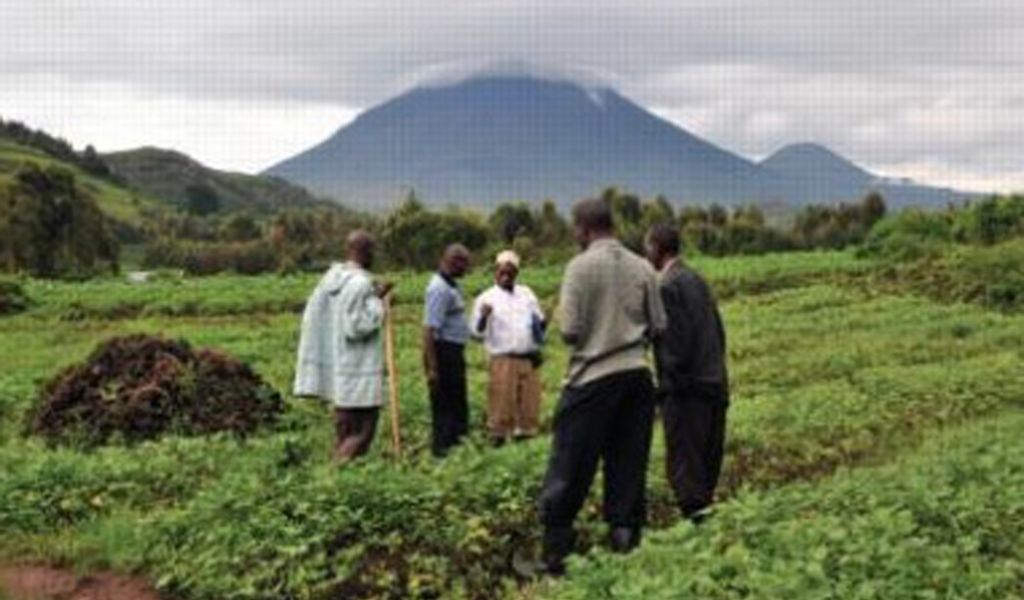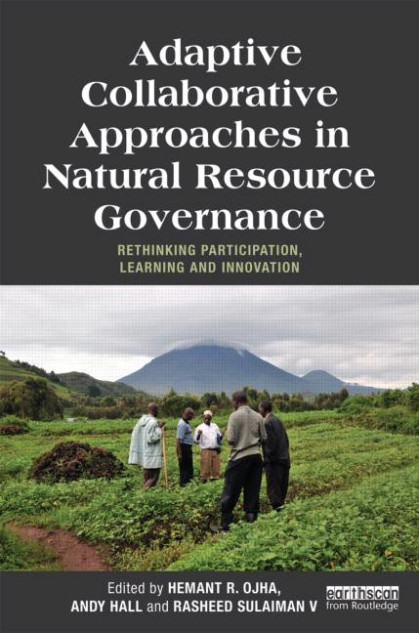How Adaptive and Cooperative are the Stakeholders in Natural Resource Management?

Why this book?
Are stakeholders in natural resource management sufficiently adaptive and collaborative in addressing the issues of equity, sustainability and productivity? This book attempts to document on-the-ground struggles of those promoting and facilitating adaptive collaboration, their strategies, tactics, tools and techniques to address various issues impeding learning and innovation. It also discusses the different types of constraints and challenges affecting this process. Such a reflective and empirically rich account of the actors, we thought, would provide concrete lessons and ideas for how we can do better in the future.

So what exactly is the issue?
Despite three decades of participatory reforms in policies and practices in the developing world, the achievement is limited. More than 1.3 billion people who base their livelihoods on fisheries, forest, and agriculture (FAO 2004) are deprived of basic necessities and ‘freedoms’, in Amartya Sen’s terms. Moreover, the socio-ecological systems that generate these natural capitals are still fragile and are, in many cases, in the process of degradation (as is evident in the Millennium Ecosystem Assessment Report, 2005). The global climate change phenomenon is further adding stress and vulnerabilities to these socio-ecological systems and resource-poor residents, who face added challenges in achieving livelihoods security.
Undoubtedly, Natural Resource Management (NRM) policy reforms, with their participatory turn, have revealed a nuanced understanding of the problems and the vision for change. Numerous attempts have been made worldwide, and as a result quite a few innovations and transformations have taken place, empowering local communities, and facilitating fairer distribution of benefits from agriculture and NRM.
However, in the book, we argue that innovations and working examples are too small on a global scale to counteract the negative effects of human beings on ecosystems (as revealed by the Millennium Ecosystem Assessment), and untenable strategies for inclusive resource management and fair distribution of benefits in different contexts. In the worst cases, these innovations are likely to revert back once active support systems are withdrawn (as the experiences of contributors in this volume show).
It is therefore clear that the current way of doing participatory natural resource management is not the ‘end of history’[i] of NRM – such that a final policy approach has already been discovered and all that we need to do is to ‘implement’ it in practice.
The continuing challenges
There are at least three problems with the current approach. First, the actors who drive these approaches (be they policy makers, donors or conservation agencies) blame the local actors and institutions for the complex problems of resource degradation, as if the larger policy and institutional regimes are working just fine. This shifts the onus onto communities while absolving the underlying governing structure.
Second, the current approach to change is still guided by a technocratic worldview – which privileges experts and policy makers to make decisions for others, disregarding the agency and capability of the poor and affected local communities. Even the well-accepted participatory approach has legitimized expert-led, Euro-centric, modernist visions and strategies of change, forcing everyone to think through Western lenses (Shiva 1988; Scott 1998) – in effect creating ‘participatory exclusions’ (Agarwal 2001).
Third, most reforms occur only on paper, not in practice.
In this book, we studied existing practices to understand the possibilities of such change. We did not want to advocate participatory, collaborative and community based approaches. Instead, we wanted to explore how stakeholders can foster, at all levels of governance, more effective learning and cooperative actions – two important elements of Adaptive Collaborative Approach (ACA).
Contributors of the book asked the same question in different contexts of environmental management covering Asia, Africa and South America: what prevents adaptive and collaborative approaches from taking root in the practice of natural resource management? This book is a compilation of stories told by practitioners and action researchers, rather than fresh research done solely by us, the editors.
Message
Although stories captured in the book are complex, the core message is simple: challenges to adaptive learning and collaborative governance are numerous and fundamental, and have roots outside the ‘local’ domain. There is hardly an alternative route to effective natural resource governance other than to explore ways through which actors can engage better with one another, harness cooperation and pool knowledge for more adaptive approaches in the face of increasing uncertainty. But we need radically different ways to apply this principle, for which we need to nurture and support new types of researchers who bridge, broker and facilitate change across diverse institutions, scales, and knowledge communities. The business-as-usual method of developing technical solutions and then using extension systems to put the research into use does not work.
It is also time to reflect upon the limits of our own learning about learning and innovation in natural resource systems – why can’t we first change our own institutions and practices when we ask others to do the same? Spending too much on developing too specific solutions is wastage; it is always better to engage in co-creating knowledge and fostering cooperative actions. More actions are needed to explore how ACA can be better grounded as modus operandi of policy and institutional development as well as management practices.
[i]We draw a metaphor from Francis Fukuyama’s (1992) view that the world has finally discovered a system of governance based on market and liberal political system. We do not see such end of history at least in the context of natural resource governance.

